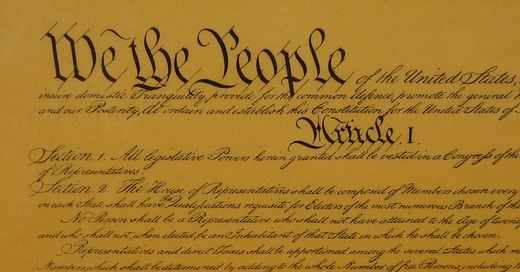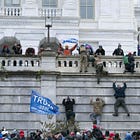The Weekend Wrap: November 19, 2023
Efforts to keep Trump off the ballot, and a proposed trial date in Georgia
Welcome to the Weekend Wrap! Here is last week’s white collar news:
White Collar Highlights
Efforts to Keep Trump Off the Ballot
I’m sure you’ve heard about the lawsuits filed around the country arguing that Trump should be disqualified from running for president in 2024 under the 14th Amendment.
Section 3 of the 14th Amendment provides:
No Person shall be a Senator or Representative in Congress, or elector of President and Vice President, or hold any office, civil or military, under the United States, or under any State, who, having previously taken an oath, as a member of Congress, or as an officer of the United States, or as a member of any State legislature, or as an executive or judicial officer of any State, to support the Constitution of the United States, shall have engaged in insurrection or rebellion against the same, or given aid or comfort to the enemies thereof. But Congress may by a vote of two-thirds of each House, remove such disability.
The argument in these lawsuits is that Trump previously took an oath as an “officer of the United States” to support the Constitution, and then engaged in an insurrection or rebellion against the U.S. on January 6, 2021 by inciting the Capitol riot. Therefore, the suits claim, he is now ineligible for the office of the presidency.
The Minnesota Supreme Court recently ruled that a lawsuit to disqualify Trump under this provision was premature because he's not yet officially the Republican candidate. It said the suit could be brought again later if he wins the nomination. A Michigan judge dismissed a similar lawsuit.
In Colorado, state judge Sarah Wallace held a week-long evidentiary hearing on the lawsuit to keep Trump off the ballot and heard from a number of witnesses. On Friday she issued her 102-page decision. It’s a damning, detailed recital of Trump’s actions leading up to and on January 6, 2021. She found that Trump repeatedly embraced and encouraged violent political rhetoric, and that after summoning an armed mob to Washington he encouraged them to march to the Capitol, intending that they would use force to stop the election from being certified:
“The Court concludes, based on its findings of fact and the applicable law detailed above, that Trump incited an insurrection on January 6, 2021 and therefore “engaged” in insurrection within the meaning of Section Three of the Fourteenth Amendment.”
That’s a pretty momentous finding.
The judge also concluded that Trump’s speech to the mob at the Ellipse was not protected by the First Amendment because it met the Supreme Court’s Brandenburg test for unprotected speech: that his speech was intended to produce imminent lawless action and was likely to do so. I think she’s right about that, as I wrote here nearly three years ago:
But having made these damning findings, the judge then pulled defeat from the jaws of victory for the plaintiffs. She ruled that the president is not an “officer of the United States” within the meaning of the 14th Amendment and so the disqualification provision does not apply to Trump.
On its face this sounds like an absurd technicality. Why would the drafters of the 14th amendment leave such a giant loophole, exempting the highest office in the land from its prohibition? That was certainly the view of some leading constitutional scholars:
But there actually is some textual support for the argument that “officer” as used in the Constitution is a term of art, and refers to people who are appointed by the president – which obviously would not include the president himself. The judge quoted several other provisions of the Constitution where the language suggests that the President and “officers of the United States” are indeed distinct. The judge said she thought it was a close question and that it wasn’t clear to her why the drafters of the 14th Amendment would have created this loophole (or whether it was even intentional). But she concluded that’s what the language requires.
This is a controversial holding and will be unpopular with many, but I don’t think it’s crazy. Others support this interpretation, including some academics and a former U.S. Attorney General. And you can hardly accuse the judge of being in the bag for Trump if you read her searing indictment of his actions.
What particularly resonated with me was what the judge said at the end of her opinion:
To be clear, part of the Court’s decision is its reluctance to embrace an interpretation which would disqualify a presidential candidate without a clear, unmistakable indication that such is the intent of Section Three. As Attorney General Stanbery again noted when construing the Reconstruction Acts, “those who are expressly brought within its operation cannot be saved from its operation. Where, from the generality of terms of description, or for any other reason, a reasonable doubt arises, that doubt is to be resolved against the operation of the law and in favor of the voter.” (emphasis mine)
In other words, when there is any doubt or ambiguity, we should resolve it in favor of allowing the voters to choose.
I think that makes sense. I’ll confess these lawsuits make me uneasy. I’m not sure it’s a good idea to start down the road of asking a single judge or a secretary of state to decide who gets to be on the presidential ballot, taking the decision out of the voters’ hands. You could easily see that becoming a source of political mischief. For example, it’s not hard to imagine a secretary of state in a deep-red state claiming that Joe Biden’s “weaponization of the Justice Department” amounts to a rebellion against the United States, finding a right-wing judge who will agree with him, and kicking Biden off the ballot. (Texas, don’t get any ideas.)
These cases are probably destined for a fast track to the Supreme Court. It would need to decide the case during this term (which ends next June) for it to have any impact.
But as I’ve argued before, we can’t rely on the legal system – whether it’s these lawsuits, Jack Smith, or previously Robert Mueller – to save us from Trump. I think the time and energy spent on these lawsuits would be better spent educating and organizing voters and making sure that they vote in the fall.
Voters need to reject Trump at the ballot box. If they don’t, and choose to put him back in office after all that we’ve seen — well, then the country will get the government it deserves.
House Ethics Committee Slams Santos
On Thursday the House Ethics Committee released its report of its investigation into misconduct by Representative George Santos (R-NY). The Committee found there is substantial evidence that Santos engaged in fraud related to his campaign funds, including spending thousands in campaign contributions on spa treatments, luxury goods, and vacations. He also reported personal loans to his campaign that did not exist and that he then “repaid” to himself. Following the release of the report, the Chair of the committee introduced another resolution to expel Santos from the House.
Keep reading with a 7-day free trial
Subscribe to Sidebars to keep reading this post and get 7 days of free access to the full post archives.






